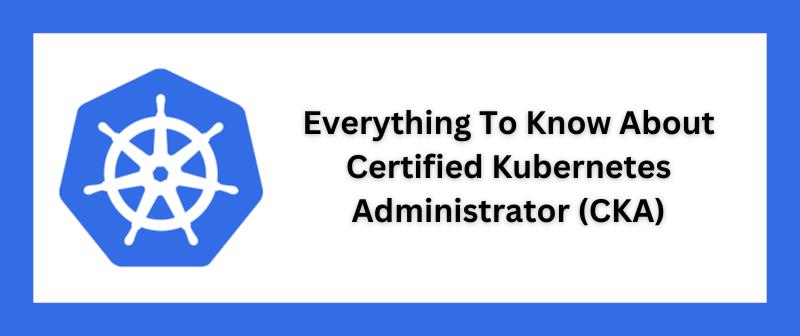Everything To Know About Certified Kubernetes Administrator (CKA)

In the rapidly evolving world of cloud native technologies, Kubernetes Training has emerged as the leading container orchestration platform. As organizations increasingly adopt Kubernetes for managing their containerized applications, the demand for skilled professionals who can efficiently handle these systems is soaring.
One of the most sought after credentials in this domain is the Certified Kubernetes Administrator (CKA) certification. This article explores everything you need to know about the CKA, including its significance, exam details, preparation strategies, and career benefits.
What is the Certified Kubernetes Administrator (CKA) Certification?
The Certified Kubernetes Administrator (CKA) certification is a professional accreditation offered by the Cloud Native Computing Foundation (CNCF). It is designed to validate a candidate s ability to effectively manage Kubernetes clusters in a production environment. The certification demonstrates that an individual possesses the skills and knowledge required to handle the complexities of Kubernetes deployment, management, and troubleshooting.
Why Pursue the CKA Certification?
Following are the main reasons to pursue the CKA Certification -
Industry Recognition: Kubernetes is a leading container orchestration platform used by companies worldwide. Earning the CKA certification positions you as an expert in Kubernetes administration, making you a valuable asset in the job market.
Career Advancement: With the rise in cloud native technologies, organizations are looking for certified professionals who can optimize their Kubernetes environments. The CKA certification can open doors to advanced roles and increase your earning potential.
Skill Validation: The CKA exam covers a broad range of Kubernetes topics, ensuring that certified professionals have a comprehensive understanding of Kubernetes administration. This validation can boost your confidence and credibility in managing complex Kubernetes systems.
Exam Details
The CKA exam is a rigorous test designed to assess practical knowledge and skills in Kubernetes administration. Here are some key details about the exam -
Format: The exam is a performance based, hands on test. You ll be required to complete a series of tasks in a live Kubernetes environment.
Duration: The exam lasts for 2 hours.
Cost: As of 2024, the exam fee is $395 USD, which includes one free retake if needed.
Prerequisites: While there are no formal prerequisites, it is highly recommended to have some hands on experience with Kubernetes and a basic understanding of container orchestration.
Exam Domains and Objectives
The CKA exam tests knowledge across several key domains. These include -
Cluster Architecture, Installation, and Configuration (25%): This domain covers the setup and management of Kubernetes clusters, including installing Kubernetes components and configuring cluster networking.
Workload and Scheduling (15%): Candidates must demonstrate proficiency in deploying and managing applications within Kubernetes, including understanding pod scheduling and resource management.
Services and Networking (20%): This section tests your knowledge of Kubernetes networking, including services, network policies, and ingress controllers.
Storage (10%): Understanding Kubernetes storage solutions, such as persistent volumes and storage classes, is crucial for this domain.
Troubleshooting (30%): The ability to diagnose and resolve issues in a Kubernetes environment is a major focus of the CKA exam. This includes troubleshooting cluster components and application issues.
Preparation Strategies
Successfully passing the CKA exam requires thorough preparation. Here are some strategies to help you get ready -
Study the Official Curriculum: Review the exam curriculum provided by the CNCF. This will give you a clear understanding of the topics covered and the skills required.
Hands On Practice: Since the exam is performance based, practical experience is crucial. Set up your own Kubernetes clusters and practice managing them. You can use platforms like Minikube or kind (Kubernetes IN Docker) for hands on practice.
Take a Training Course: Consider enrolling in a CKA preparation course. Many online platforms offer comprehensive courses that include lectures, labs, and practice exams. Some popular options include courses from Linux Academy, Udemy, and A Cloud Guru.
Use Practice Exams: Practice exams are a valuable tool for assessing your readiness. They can help you familiarize yourself with the exam format and identify areas where you need to improve.
Join a Study Group: Engaging with a community of learners can be beneficial. Join online forums, discussion groups, or local meetups to share knowledge and resources with others preparing for the CKA exam.
Career Benefits
Earning the CKA certification can have a significant impact on your career -
Increased Job Opportunities: Many organizations require or prefer candidates with Kubernetes certification for roles such as Kubernetes Administrator, DevOps Engineer, and Cloud Engineer.
Enhanced Professional Credibility: The CKA certification is recognized globally and can enhance your professional reputation within the tech community.
Higher Salary Potential: Certified Kubernetes Administrators often command higher salaries compared to their non certified peers, reflecting the specialized skills and expertise they bring to their roles.
Career Growth: The CKA certification can be a stepping stone to advanced certifications and roles within the cloud native ecosystem, such as Certified Kubernetes Application Developer (CKAD) or Certified Kubernetes Security Specialist (CKS).
Final Thoughts
The Certified Kubernetes Administrator (CKA) certification is a valuable credential for professionals looking to validate their skills in managing Kubernetes environments. By understanding the exam details, domains, and preparation strategies, you can enhance your chances of success and leverage the certification to advance your career in the cloud native space.
With the growing adoption of Kubernetes, the CKA certification represents a significant opportunity to stand out in a competitive job market and contribute to the future of container orchestration.
Post Your Ad Here

Comments (2)
kritishah6
Software Developer
Great article! I really appreciate how you broke down the topic into easily digestible points.
Tarun Saini3
Consultant
Hi Marcos,
Thank you for sharing this type of informative content. It is very helpful,, You have included many helpful information about Kubernetes in this article.